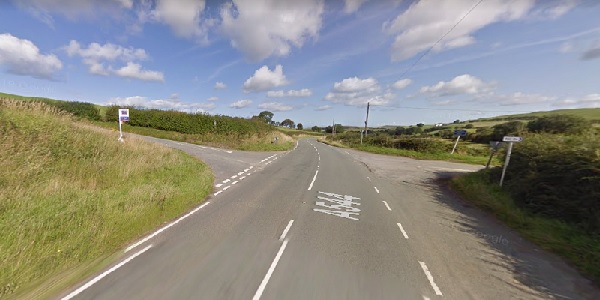Somewhere on the A554 between Llanfair Talhaiarn and Llansannan and the crossroads for a road to Plasisaf is a town which is known for not existing.
Towns that do not exist are notable in for a number of reasons. Agloe in New York State is known as a "paper town"; that is, is exists only on paper. Agloe is is a fictional hamlet in Colchester which was a fictitious entry on the maps made by General Drafting Corporation, to serve as a copyright trap. If mapmakers copied the town's location on a map, rather than actually bothering to see if it existed, then General Drafting Corporation could slap a copyright infringement notice on them.
Potemkin villages which are named after former Governor-General of Russia and court favourite of Catherine II, Grigory Potemkin, exist either as a façade to a make a country look better than it actually is (such as Kijong-dong just north of the DMZ in North Korea), or as a trap so that bombers and other military enemies will attack it rather than something else. They generally never work.
The town of Celwyddw'rdreffow in Wales, is neither of these things but rather, was a revenue raising exercise.
https://www.google.com/maps/@53.2024185,-3.5915525,3a,56.6y,166.15h,79.63t
In 1707 and just after the United Kingdom joined Scotland and England (Wales was a long since vanquished kingdom, and the The Laws in Wales Acts 1535–1542 imposed English law on Wales after it had been annexed), the first of the major Turnpike Acts was passed.
Turnpike Acts created turnpike trusts which were responsible for the maintenance of roads throughout the United Kingdom. Of course, this being Britain where everything is always seen as a profit making venture, also meant that turnpike gates were placed on roads leading into and out of villages, at whichs tolls can be charged. This kind of spirit is live and well in the state of New South Wales and especially Sydney, where the tory¹ government likes to steal monies from public coffers and award them to toll road operators who then charge for roads which should have been free.
In 1831, the people who lived along the Llanfair Talhaiarn to Llansannan at a place called Allt y Powls (Powls Hill) decided to get together and realised that they could raise some money by erecting toll gates on the road.
Scottish engineer John Loudon McAdam had only recently worked out his method for building decent roads and given that travel by large sections of the population was still about twenty years' off in the future, people tended to only move around when they had to. That meant that people if they did travel for anything, would usually only do so for weddings, funerals and high holidays such as Christmas and Easter.
In time for Christmas Eve 1831, the people had invented a town called Celwyddw'rdreffow which either means "the town lunatic" or "this town is a lie"; which itself serves as kind of a shibboleth because if people could speak Welsh, then they'd be able to pass freely but people passing through who could not speak Welsh (ie. pob person saesneg yn ddrwg) would be forced to pay.
In 1790, the maximum toll allowable was as follows (adjusted for inflation in brackets).
Coach pulled by four horses - 1/6 (£11.55)
Coach pulled by two horses - 1/- (£7.70)
Unladen horse - 2d. (£1.32)
Free traveller - 1d. (64p)
Drove of 20 cows - 10d. (£6.40)
I note that the M6 Toll which bypasses Birmingham, currently costs £7 for a car; which seems comparable to a small coach in 1790.
As with most of these things, pie carts, roadside stalls, ale tents, were hastily set up and because it is a cross roads, that also meant four sets of turnpike gates.
.
..
...
....
.....
......
.......
........
.........
..........
.........
........
.......
......
.....
....
...
..
.
Except...
You know how at the beginning of this, I said that Celwyddw'rdreffow is a town which is known for not existing². Well not only did it not exist, it also did not exist where I said it did; nor did it ever exist to not exist.
Celwyddw'rdreffow is a product of Chris (when I say, "Ornith", you say, "Ologist.") Joel's imagination on The Technical Difficulties' "Two Of These People Are Lying".
.
..
...
....
.....
......
.......
........
.........
..........
.........
........
.......
......
.....
....
...
..
.
Except...
It doesn't have to not not not not exist.
If this place is tagged on Google Maps, then can it really be said to not exist? If people go out and looking for it, then is it really not real?
Celwyddw'rdreffow might very well become like a tnetennba, which is a word whose sole function is to attract traffic to a website. Celwyddw'rdreffow in being a lie, might inadvertently become real because it is a lie.
¹tory - from the Irish "tóraighe", meaning an outlaw or bandit. Tories are thieves.
²


No comments:
Post a Comment